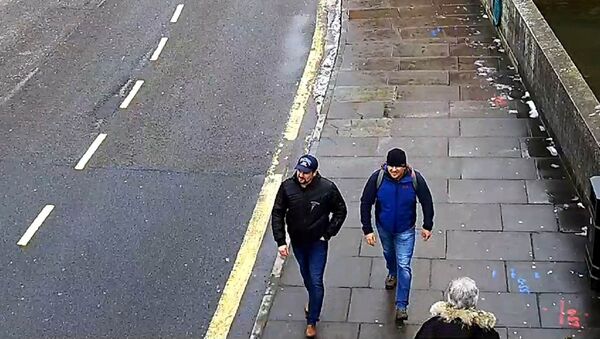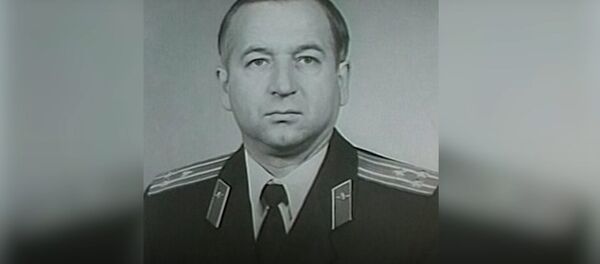Alexander Petrov and Ruslan Boshirov were accused by London of poisoning former double agent Sergei Skripal and his daughter Yulia with a nerve agent in Salisbury. UK Prime Minister Theresa May has said she believes that the suspects work for the Main Directorate of the Russia General Staff of the Armed Forces (formerly known as the GRU), albeit without providing any evidence.
Moscow has denied allegations, repeatedly asked for evidence to be shared and for access to the case and decried the UK approach of baseless accusations. In early September, Petrov and Boshirov came forward and gave an interview to RT and Sputnik, saying they visited Salisbury as tourists.
READ MORE: Salisbury to Be Rebranded After Skripal Case Caused Tourism Slump — Official
Too Broad for So-Called Assassination
In early September, the UK police released images of two Skripal case suspects, identified by London as Petrov and Boshirov. According to UK Senior National Coordinator for Counterterrorism Policing Neil Basu, the two men arrived at London Gatwick Airport from Moscow on March 2, traveled to the Salisbury area the following day purportedly for reconnaissance purposes and on March 4 allegedly contaminated the Skripals' front door with the nerve agent. Later the same day, Petrov and Boshirov returned to London and shortly after left for Moscow, the coordinator added, citing the CCTV footage.
"Covert action or targeted killing operations always required a person to first take a reconnaissance — this is the normal operational procedure. When I first saw the CCTV footage of two guys, purported to be Russian GRU military intelligence officers, walking around together in London and Salisbury, my first thought was they must be amateurs," Anderson said.
At MI6, officers "on a job overseas" would never walk around together, like Petrov and Boshirov were allegedly doing, Anderson explained.
"The nearest we would be to a colleague would be at least 100 yards apart in a less crowded place like Salisbury. If the duo of spies were indeed GRU were they not aware that both London airports — Heathrow and Gatwick — each has 10,000 active CCTV cameras? The London Underground's CCTV are everywhere to be seen, too. My point of referencing this to you is their footprint was broad for a so-called assassination. British operators' would not have even left a fingerprint for others to find," the former officer said.
Earlier Friday, The Telegraph newspaper claimed that the UK authorities had allegedly tracked down and identified a third suspect in the Skripal case, who is believed to have visited Salisbury for reconnaissance purposes before the poisoning. The authorities also believe that this person allegedly informed the attack perpetrators about the layout of the cul de sac where Skripal’s house was located and the door that the Russian former intelligence officer used to enter his house, according to the newspaper. The UK Metropolitan Police, which is in charge of the investigation into the Salisbury poisoning, has refused to comment to Sputnik on this publication.
READ MORE: UK Authorities Identify 3rd Suspect in Salisbury Poisoning Case — Reports
Answering a question on whether the newspaper could be trusted to reveal a third suspect without a statement on the issue from the UK police, Anderson said that he found it troubling that a newspaper would "come right out to support a political agenda without first gaining support of circumstantial evidence from the police or the Security Service (MI5)."
Aggravating Situation by Refusal to Cooperate
Regarding London's unwillingness to cooperate with Russia on the investigation, the former MI6 officer said that working together "usually throws insightful light on any subject," although disclosure between the parties could be partial just to see what the other side's opinion is.
"Once hearing that viewpoint then a decision can be concluded or trashed completely, but you've first got to be of the frame of mind to 'hear out' what they have to say. To shut the door in someone's face and blame them straightaway only aggravates," Anderson said.
READ MORE: Chepiga's Ex-Commander Calls Claims About Skripal Suspect Identity Schizophrenia
Recalling his experience, the ex-officer said that one could gather "fascinating" information from encountering the adversary face-to-face.
"However, I also know that my situation reports from the field were occasionally ignored because the powers-that-be only wanted incoming information that supported their pre-set agenda. Anything against that agenda never saw the light of day," Anderson concluded.
Moscow has repeatedly said it was ready to cooperate on the case with the UK side. The Russian Foreign Ministry has sent some 60 diplomatic notes to the UK Foreign Office demanding that Russia be given access to the investigation and the injured Russian citizens, as well as requesting legal assistance and proposing cooperation, including on the joint inquiry. The UK authorities have not responded to any of these notes.
The views and opinions expressed by the speaker do not necessarily reflect those of Sputnik.




